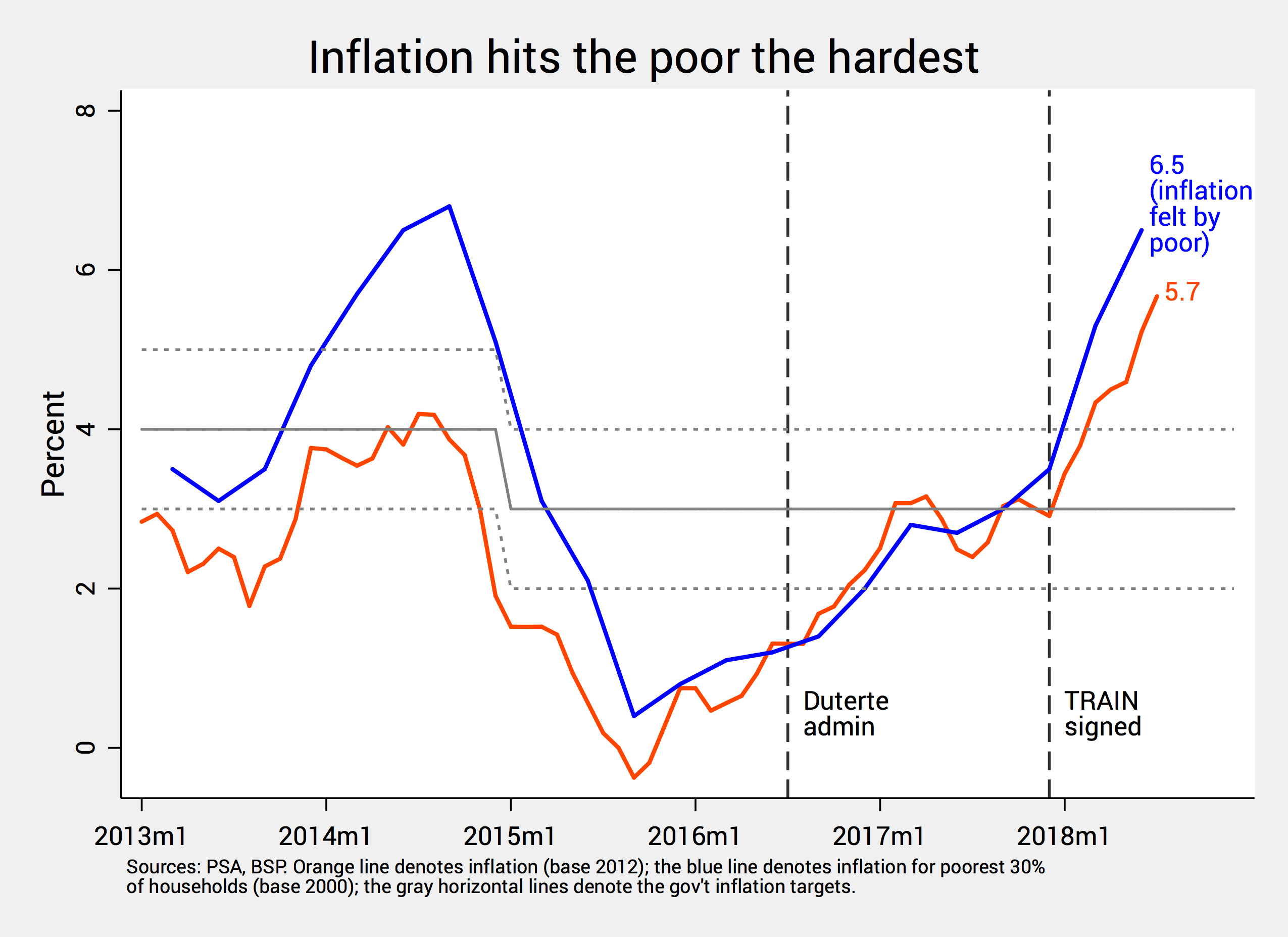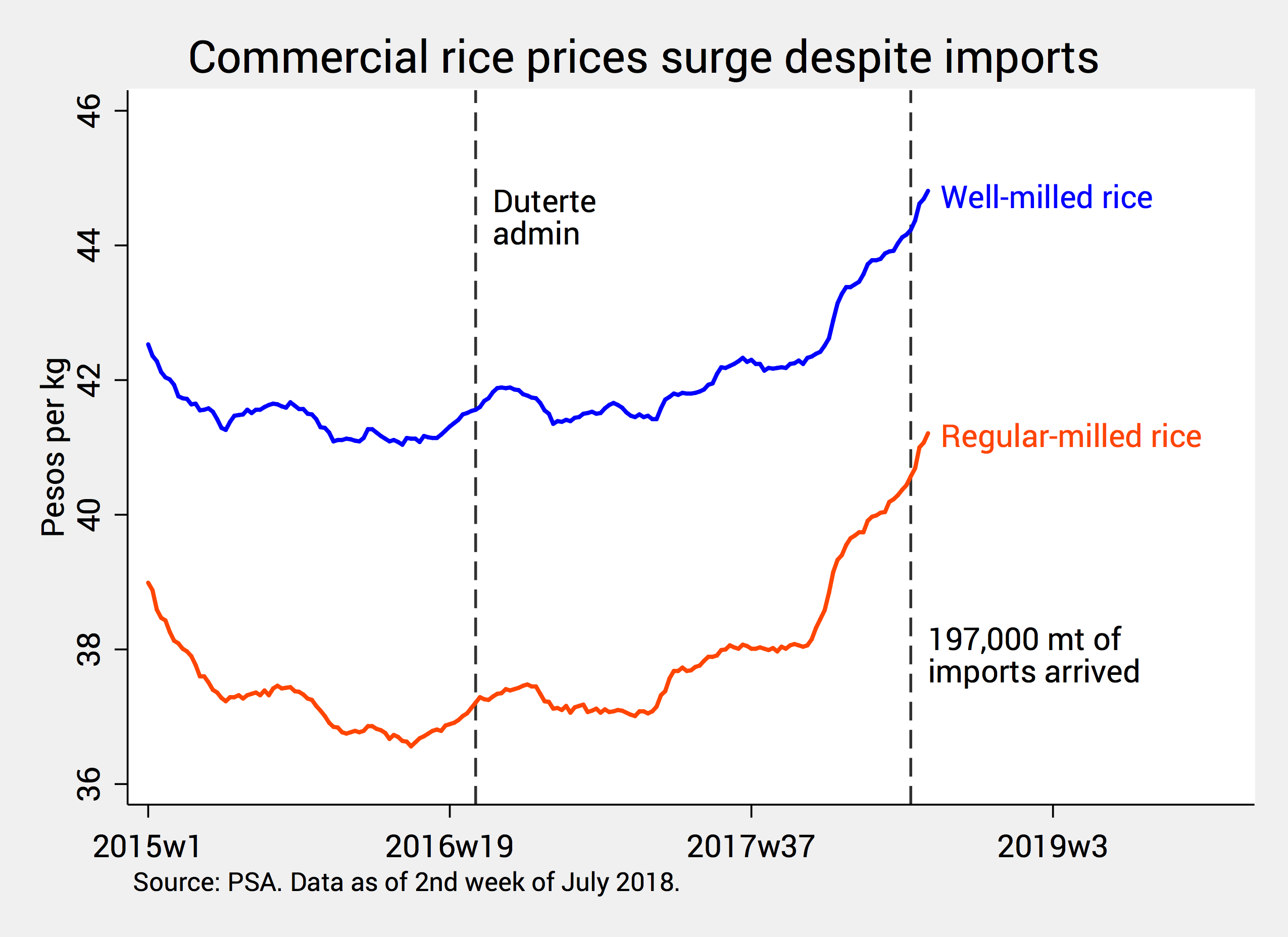SUMMARY
This is AI generated summarization, which may have errors. For context, always refer to the full article.
![[OPINION] Can government deliver us from runaway inflation?](https://www.rappler.com/tachyon/r3-assets/600BFECF28414D6DB2B927C05DF6B881/img/1066EE0C421F4F1C90176B31D5EBF43A/can-government-deliver-us-from-runaway-inflation-Aug-8-2018.jpg)

If government is doing anything at all to fight the recent acceleration of prices, it’s clearly not being felt yet.
Yesterday the government announced that the country’s inflation rate – which measures how fast prices are rising – reached 5.7% in July, up from 5.2% in June.
The orange line in Figure 1 shows that this is the highest inflation rate in many years, the 7th consecutive month of accelerating prices, and well beyond the 4% upper target set by the government for this year.
What’s more, inflation is especially punishing for the poor. The blue line in Figure 1 shows that, as of the second quarter of 2018, the inflation rate felt by the poorest 30% of Filipino households clocked in at 6.5%.

Figure 1. Note that the blue trend uses a different base year from the orange trend.
Because of runaway inflation, government officials are now scrambling to find ways to temper it.
In a recent meeting, Speaker Gloria Macapagal-Arroyo, an economist by training, convened Duterte’s economic managers and brainstormed what can be done to fight inflation. Arroyo later came up with 5 proposals on how exactly to go about this.
But will these ideas work at all? Can government deliver us from runaway inflation?
Food’s role
Easily half of recent inflation can be explained by food prices alone. Vegetables, for example, registered an inflation rate of 16% in July, followed by corn (13%), fish (11.4%), meat (6%), and rice (5%).
This is crucial since the poor spend a larger share of their incomes on food, so that even slight upticks of such items could prove disastrous for them.
Rice prices are particularly important because the poor spend about a third of their food budget solely on rice.
Figure 2 shows that rice prices continue to soar in recent months, and this is despite the arrival of 197,000 tons of imported rice from Vietnam and Thailand in mid-June.
This is odd. Basic economics tells us that a surge of rice supply should lower its price, but somehow this hasn’t happened yet.
The National Food Authority (NFA) blames a slew of typhoons (particularly Domeng) for the slow distribution of imported rice from ports nationwide. But more than a month since the arrival of new imports, rice prices are still shooting up.
What gives?
Is the typhoon season still to blame? Does it normally take a full month to unload rice from the cargo ships and distribute them nationwide? Government officials have yet to give satisfactory answers to these questions.

Figure 2
Meanwhile, data also show that poorer regions (like ARMM and Bicol) hurt from inflation more, and again this has something to do with food.
Figure 3 shows that regions with high overall inflation tend to have high food inflation as well. This suggests that addressing food supply issues would really go a long way in tempering inflation nationwide.

Figure 3
Arroyo’s proposals
The singular importance of food in recent inflation is the reason why Speaker Arroyo’s proposals are actually not half bad.
Aside from talking about the pending rice tariffication bill – or the conversion of rice import quotas into their equivalent tariffs – Arroyo reportedly suggested additional rice imports to the tune of 500,000 tons, as well as lower tariffs on fish and meat.
Indeed, many economists expect the rice tariffication bill to shave as much as P4 to P7 per kilogram off commercial rice prices. Now that it has been certified urgent by Duterte, it could soon counteract the NFA’s glaring inability to make a dent on rice prices.
Meanwhile, lower tariffs on meat and fish might also abate inflation. But this also requires congressional action and might take some time unless also deemed urgent by Duterte.
Aside from food policies, Arroyo also proposed additional interest rate hikes by the Bangko Sentral (which many expect to happen in this week’s meeting of the Monetary Board), as well as deferred energy rate hikes.
But, as I noted before, interest rate hikes work best when inflation is driven by demand factors, not when it is driven supply factors. (READ: Why inflation is actually at a 9-year high)
In the end, it’s uncertain whether Arroyo’s proposals have any teeth at all to combat inflation in the coming months.
But Arroyo’s eager involvement in the economic discussions is, in itself, noteworthy for two reasons.
First, it is a rare display of economic leadership, something we haven’t seen from President Duterte in the 2 years he’s been in office. While Arroyo came up with a list of anti-inflation policies in no time, Duterte is still busy reading Economics for Dummies.
Second, Arroyo’s involvement is – begrudgingly – already an improvement over the economic managers’ previous remarks about inflation, which often reeked of denial, callousness, and indifference.
If you recall, in response to rising inflation, Socioeconomic Secretary Ernesto Pernia and Budget Secretary Ben Diokno simply told us on separate occasions to “tighten our belts,” “live with it,” and be “less of a crybaby.”
One assistant secretary of the Department of Finance also recently said that year-on-year inflation is an “abstract concept” and that, compared to month-on-month inflation, it is “not how people experience prices.”
Still other officials’ remarks about inflation betray their sheer stupidity. For instance, Agriculture Secretary Manny Piñol recently reiterated that rice prices didn’t help cause higher inflation. Earlier he even proposed to remove food from the computation of inflation. (READ: To beat inflation, we can’t just fudge the numbers)
Government’s fault
Lest we forget, government itself is partly to blame for higher inflation today, mainly through the TRAIN law signed by President Duterte.
Finance Secretary Sonny Dominguez recently bewailed the fact that inflation is now a “politicized” issue that hampers future tax reform measures.
Inflation has always been a political issue.
TRAIN’s proponents have somehow brought this upon themselves. Not only did they grossly underestimate the law’s impact on inflation, but today they also aggressively downplay TRAIN’s contribution to inflation.
One would think that, because of the fallout from TRAIN 1, the economic managers will be more careful and circumspect with their proposed policies. But now all hands are on deck for TRAIN 2, which they expect Duterte to sign before year-end.
Why are they in such a rush?
In the end, economic policy is too important to be left solely in the hands of PhD-wielding economists in government. God knows they’re not always the best persons to make economic decisions in our behalf.
Ordinary citizens too must do their part in the fight against inflation. Even if we can do little by way of crafting actual decrees or laws, we can continue to engage our economic managers, pressure our lawmakers, and hold them all accountable for their words and deeds.
After all, we have more to lose from runaway inflation than they do. – Rappler.com
The author is a PhD candidate at the UP School of Economics. His views are independent of the views of his affiliations. Follow JC on Twitter: @jcpunongbayan.
Add a comment
How does this make you feel?















There are no comments yet. Add your comment to start the conversation.